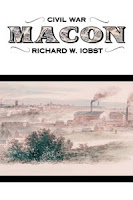 Situated along the banks of the Ocmulgee River near the state of Georgia's geographical center, the industrious town of Macon experienced an even greater economic boon during the Civil War years. Richard Iobst's excellent Civil War Macon: The History of a Confederate City, originally published in 2000 and newly re-released in paperback, remains the standard work on the important Georgia town.
Situated along the banks of the Ocmulgee River near the state of Georgia's geographical center, the industrious town of Macon experienced an even greater economic boon during the Civil War years. Richard Iobst's excellent Civil War Macon: The History of a Confederate City, originally published in 2000 and newly re-released in paperback, remains the standard work on the important Georgia town.At over 450 pages, Iobst's study is a lengthy one, but, given the town's economic and military importance to the Confederate cause, such attention is entirely appropriate. The author begins with an overview of the Macon citizenry's reaction to the secession movement that gripped the lower South, as the city fathers and local merchants prepared for the possibility of armed conflict. The organization of militia and volunteer units is covered in some detail, as well as the routines of civilian society far from the front lines. Another chapter, making good use of newspaper and manuscript source materials, examines the increasing challenges to civilian life in Macon between 1862 and 1864, and how they were met.
Macon's location afforded protection from immediate harm from enemy raids or invasion. This, and its good transportation links, made the town a prime location for military hospitals. The number of patients treated in Macon exploded with the September 1863 Battle of Chickamauga, and Iobst devotes a chapter to the organization, supply, and staffing of the military hospitals, most notably the Floyd House Hospital and the converted Blind Academy (later renamed the Ocmulgee Hospital). The geographical advantages that made Macon a good site for military hospitals also made it a prime location for a POW camp. Iobst discusses the prisoner conditions at Camp Oglethorpe, as well as its administrative difficulties.
Three chapters meticulously describe the operations of Macon's Confederate arsenal, armory, and central laboratory. While the powder works at Augusta is more famous, the facilities at Macon were also of great importance to the Confederate war effort. Iobst chronicles well the expansion of existing factories, as well as the construction of new ones, all in the face of a constant lack of proper funding, equipment, and both skilled and unskilled labor. Their output is profiled in these chapters, and the laboratory's importance as an ordnance and ammunition testing facility is outlined. Students of Confederate logistics and supply will find these sections of great interest.
The latter chapters are largely comprised of well constructed tactical histories of the fighting that occurred just outside the city gates, first with Stoneman's Raid in the summer of 1864 to be followed only weeks later by the March to the Sea. The city ultimately fell to the command of General James H. Wilson during his famous 1865 raid. A lengthy final chapter discusses life in the city under Wilson's military occupation.
If there is any complaint with Civil War Macon, it is with the dearth of maps. A single rough drawing of the fortifications located around the outskirts of town is included, but a detailed street map really should be a part of every city study. Tactical maps of the otherwise well described actions fought near Macon would have been very helpful, as well. Nevertheless, Civil War Macon is one of the best Civil War city studies available in the literature today, a model history of exceptional depth. Highly recommended.

No comments:
Post a Comment
***PLEASE READ BEFORE COMMENTING***: You must SIGN YOUR NAME ( First and Last) when submitting your comment. In order to maintain civil discourse and ease moderating duties, anonymous comments will be deleted. Comments containing outside promotions, self-promotion, and/or product links will also be removed. Thank you for your cooperation.